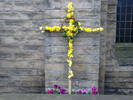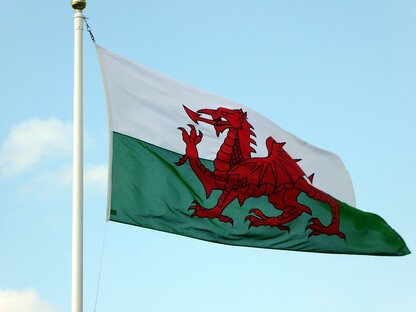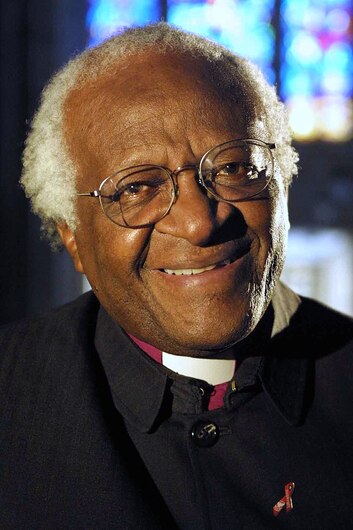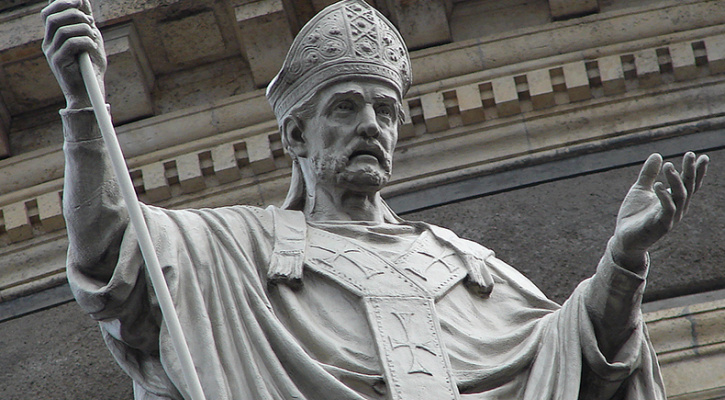The 1st of March is St. David's Day.I was asked to write about the saints in the Link for the next few months. It seems good to start with a fellow Celt and Patron Saint of Wales. St David stands among the British and Saxon saints of the early days of Christianity in the UK. Much of St David’s life is today a mix of mystery and legend, but he lived in Wales in the 6th century, preached the Gospel to the Celtic tribes of western Britain, and founded several religious communities, notably one at what is now St David’s. His rules for the monks were austere, even by the standards of the time, and legend has it that, as happened to St Benedict, his strictness made him so unpopular at one monastery that his monks tried to poison him – but, as with St Benedict, he came to no harm. It is also said that St David travelled as far as Jerusalem and that he was consecrated Archbishop by the Patriarch there – a story that may have its roots in later propaganda, as it would have indicated that the Welsh church need not be expected to take instructions from Canterbury. Be that as it may, he appears in many Welsh churches wearing headgear different from what we expect to see on an Archbishop, and about his neck is a priestly breastplate of the kind we associate with Aaron. These features seem likely to have a connection with the Jerusalem story. In Wales, St David is often depicted with a white dove on his shoulder – for it is said that once, when he was preaching outdoors, the ground miraculously rose into a mound so that he could be seen and heard more easily, and at the same time the dove alighted upon him.
Happy Saint David's Day to all with Welsh connections.
0 Comments
The recent death of Archbishop Desmond Tutu was mourned around the world. Born as Desmond Mpilo Tutu in Klerksdorp, northwest South Africa, Archbishop Tutu was iconic for his work in anti-apartheid activisim, human rights advocacy and social justice reform. Archbishop Demond Tutu (7 October 1931 – 26 December 2021)Here are five of his more famous quotes that highlight why he was so especially honoured for his justice and reconciliation work in South Africa.
Archbishop Tutu was recognised in every Christian denomination as a holy and saintly man. His wisdom speaks of eternal truths and the infinite love of God for all people. In the Orthodox and Catholic/Anglican tradition the feast of St Nicholas is 6 December.
Although Nicholas is a very popular saint in the Greek and Latin churches (i.e., Orthodox and Western), there is little known about the historical Nicholas. We know he was Bishop of Myra (Lycia in modern Turkey) at the beginning of the fourth century. Beyond that, our knowledge of Nicholas moves into legend. For example... It is said that he was imprisoned during the Diocletian persecution of the church in AD 303-304. He may have participated in the first Council of Nicaea in AD 325, one of the crucial Ecumenical Councils of the Church that helped forge Christian orthodoxy (from which we have the Nicene Creed). Nicholas is remembered for his generosity and goodwill. For this, he is considered a patron saint of sailors and children.
The truth of these legends is lost in the mists of time, so how might they be important to us today? First is the priority of care for those who are denied justice. In Nicholas’ day, children had no legal or other form of status. That was a given in the Roman Empire. Unless affluent, they were profoundly vulnerable. That is still true across the globe today. This is totally contrary to the teachings of Jesus, who points to the child as an exemplar of the Kingdom of God and in special need of care and protection. In saving the unjustly convicted sailors Nicholas shows that due process is integral to justice. In the days of Twitter storms and social media condemnation we are losing the art of measured judgement and are rushing to condemn. Nicholas warns us away from that nasty basic impulse to point the finger. He does that surely in the spirit of Jesus’ hesitancy to judge, despite being the Judge of All. Secondly in Nicholas we see someone who delights in the Gift of Life and wants to see life in others. How we live our lives – from conception to a natural death – is increasingly contested, even amongst Christians. Nicholas brought his gifts by night so as not to be noticed. We don’t see, and barely acknowledge, the Giver of our lives. In dark times when so many refugees die and suffer, when we have homeless people living on the street, when many have little food and poor shelter, part of the Christian task, in the spirit of Nicholas, is quietly and patiently, yet insistently, to promote the priority of life. St Nicholas was no ‘bah-humbug’ sort of person, and nor should we be, so following his example, let us pray that we might be humble in generosity, vibrant in our daily lives and always compassionate to the needs of the vulnerable. Then we can truly say we honour this great and popular saint. On 13 September we remembered the life and work of Saint John Chrysostom ( c.349- 407 AD), the great preacher of Antioch and the archbishop of Constantinople John was the Patriarch of Constantinople and one of the most important early theologians. He is known for his preaching and public speaking, his denunciation of abuse of authority by both ecclesiastical and political leaders and his ascetic sensibilities. The epithet Χρυσόστομος (Chrysostomos, anglicized as Chrysostom) means “golden-mouthed” in Greek and points to his celebrated eloquence. Chrysostom was among the most prolific authors in the early Christian Church, exceeded only by Augustine of Hippo in the quantity of his surviving writings. He emphasised charitable giving and was concerned with the spiritual and temporal needs of the poor.
|
AboutThe Link is a monthly publication by members and staff of Morningside United Church. Archives
|





 RSS Feed
RSS Feed
